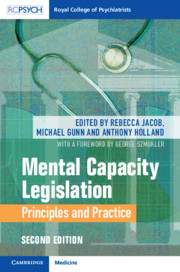Book contents
- Mental Capacity Legislation
- Mental Capacity Legislation
- Copyright page
- Contents
- Contributors
- Foreword
- Preface
- Editors’ Note
- Chapter 1 Introduction
- Chapter 2 The Assessment of Mental Capacity
- Chapter 3 Best Interests
- Chapter 4 Deprivation of Liberty Safeguards: Past, Present and Future
- Chapter 5A Mental Capacity Act Application: Hospital Settings
- Chapter 5B Mental Capacity Act Application: Social Care Settings
- Chapter 6 Mental Capacity and End of Life Decision-Making
- Chapter 7 Clinical Ambiguities in the Assessment of Capacity
- Index
- References
Chapter 5B - Mental Capacity Act Application: Social Care Settings
Published online by Cambridge University Press: 17 June 2019
- Mental Capacity Legislation
- Mental Capacity Legislation
- Copyright page
- Contents
- Contributors
- Foreword
- Preface
- Editors’ Note
- Chapter 1 Introduction
- Chapter 2 The Assessment of Mental Capacity
- Chapter 3 Best Interests
- Chapter 4 Deprivation of Liberty Safeguards: Past, Present and Future
- Chapter 5A Mental Capacity Act Application: Hospital Settings
- Chapter 5B Mental Capacity Act Application: Social Care Settings
- Chapter 6 Mental Capacity and End of Life Decision-Making
- Chapter 7 Clinical Ambiguities in the Assessment of Capacity
- Index
- References
Summary
Following the Mental Capacity Act (MCA) becoming law in 2005, and prior to its coming into force in 2007, there was a sustained effort to train support staff in the many social care settings where this new law was applicable. This training drive was necessary because, prior to the MCA, mental capacity law had evolved in the courts through consideration of a small number of cases that concerned serious medical treatments. These included the withdrawal of artificial nutrition and hydration (Airedale NHS Trust v. Bland [1993]), blood transfusion (Re T [1993]), tissue donation (Re Y [1997]) and the provision of experimental medication for terminal illness (Simms v. Simms and another (2003)). In line with the Law Commission’s recommendations, the MCA extended the application of the law to ‘all acts in connection with care or treatment’ (MCA, Section 5), meaning that, overnight, social care settings and informal family care environments immediately fell within the scope of the legislation.
- Type
- Chapter
- Information
- Mental Capacity LegislationPrinciples and Practice, pp. 82 - 90Publisher: Cambridge University PressPrint publication year: 2019

